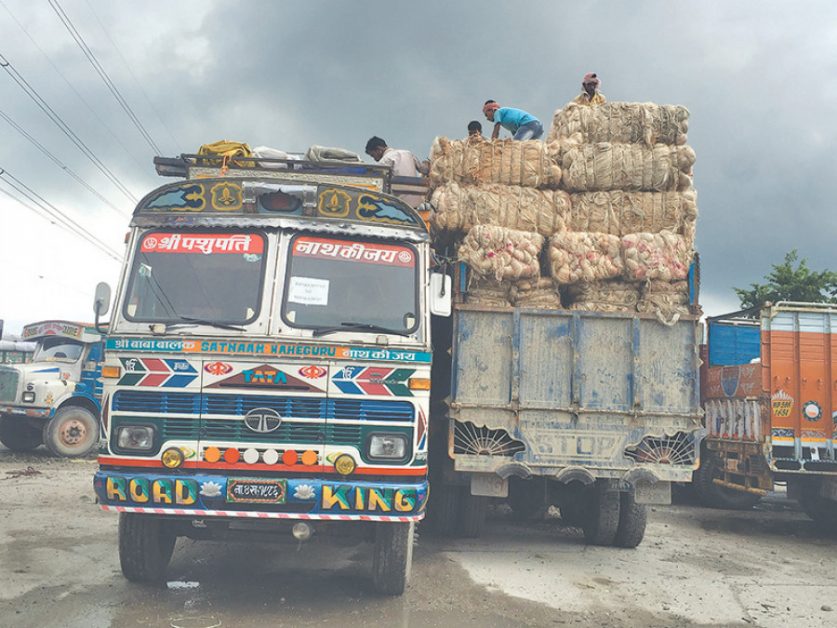November 6, 2020:The once sleepy customs yard at Bhairahawa, where a few container trucks used to roll in occasionally, is now a scene of fast-paced action as the Tarai city explodes into an economic hub.
Home to Nepal’s second international airport and the centre of a spreading industrial heartland, Bhairahawa is expanding so fast the infrastructure cannot keep up.
According to traders, the column of container trucks waiting to enter Nepal through the Sunauli-Bhairahawa border point is usually 10 km long.
After entering Nepal, there is no parking space until the customs clearance process is completed. Due to lack of a well-managed parking lot and infrastructure bottleneck at Bhairahawa customs, traffic is backed up for 20-22 km during the rainy season.
The city is developing rapidly but the government has not come up with any plan to build new trade infrastructure. The one-and-a-half-decade old customs yard has become outdated, making it more expensive for traders due to detention and demurrage charges.
Arun Goenka, managing director of the Goenka Group and vice-president of the Siddhartha Chamber of Industry and Commerce, said some traders had started re-routing their incoming shipments as it takes many days to import goods through the Sunauli-Bhairahawa point.
The point got traction in 2015 when the months-long Tarai protest in Birgunj, once the country’s leading trade route, affected imports and exports and traders started to re-route commerce through Bhairahawa. Within a short span of time, the infrastructure had become severely strained.
“I have been importing rice, wheat, coal and other goods from the Suthauli customs checkpoint of Kapilvastu for the past two weeks,” said Goenka. “The cost goes up while importing industrial raw materials and other products from the Bhairahawa point. So I am looking for alternative routes,” he said.
The cost of imported goods increases when traders have to pay additional charges like demurrage and detention of the vehicles when cargo gets halted in the middle, said traders.
Sunil KC, vice-president of the Nepal-India Chamber of Commerce and Industry, said that the Bhairahawa customs point does not have an Integrated Check Post and warehouse capacity like at Birgunj. “As a result, the cost of conducting trade through the point has been increasing.”
As the top post at the Nepal Intermodal Transport Development Committee remained vacant for two years, infrastructure development work was also halted, said KC. “Problems will recur if they are not addressed in a timely manner.”
The parking lot built for cargo vehicles at the Bhairahawa customs office premises is old. An alternative parking lot located behind the customs office can accommodate only 700 large vehicles.
The parking problem was more severe this year as all parking lots were occupied by imported automobiles which remained unsold due to the Covid-19 pandemic.
More than a thousand new vehicles have been stranded in the parking area. The automobiles imported by leading automobile dealers have not cleared customs for the past six months.
Ashim Neupane, president of the Bhairahawa Customs Agents’ Association, said that the new parking lot, which has an area of about 4 bighas, was completely filled with new automobiles. “If that place were to be vacated, there would be no parking problem.”
He said that at the beginning of the lockdown, around 2,000 new automobiles had arrived. Although some vehicles passed customs clearance during Dashain, about 1,000 automobiles still remain at the customs yard.
Krishna Dulal, president of the Nepal Automobiles Dealers Association of Nepal, said that there were no sales during the lockdown, that’s why the vehicles were left at the customs for months. He said that the vehicles would be removed from the customs premises in a few days as demand had been growing in the market of late.
The country imported 84,000 automobiles worth around Rs19 billion in the first three months of the current fiscal year, Dulal told the Post. Auto sales were down 25 percent this festive season compared to last year due to a slowdown in the economy, and also due to the postponement of the biggest automobile fair that used to happen ahead of the festival, he said.
A few days ago, a delegation led by the Siddhartha Chamber of Commerce and Industry went to the customs administration to complain that it was inconvenient and expensive to import goods through Bhairahawa due to the parking problem.
According to Kul Prasad Neupane, president at the Siddhartha Chamber of Commerce and Industry, importing goods through Bhairahawa takes longer and is also more expensive due to additional charges.
“This problem arose because the government is focused on collecting revenue and does not pay attention to improving the infrastructure,” Neupane said.
Krishna Prasad Ghimire, a customs agent, said that container trucks approaching Bhairahawa were being intercepted 9 km from the border, and instructed to take a detour and enter Nepal through the Suthauli customs point in Kapilvastu.
The Department of Customs has handed over the management of the parking lot to the Nepal Intermodal Transport Development Committee, which has assigned different companies to collect parking fees at various customs offices.
Kamal Kumar Bhattarai, chief of the Bhairahawa Customs Office, said that the parking problem would be resolved in a few days as many vehicles have been released.
Source: Kathmandu Post






